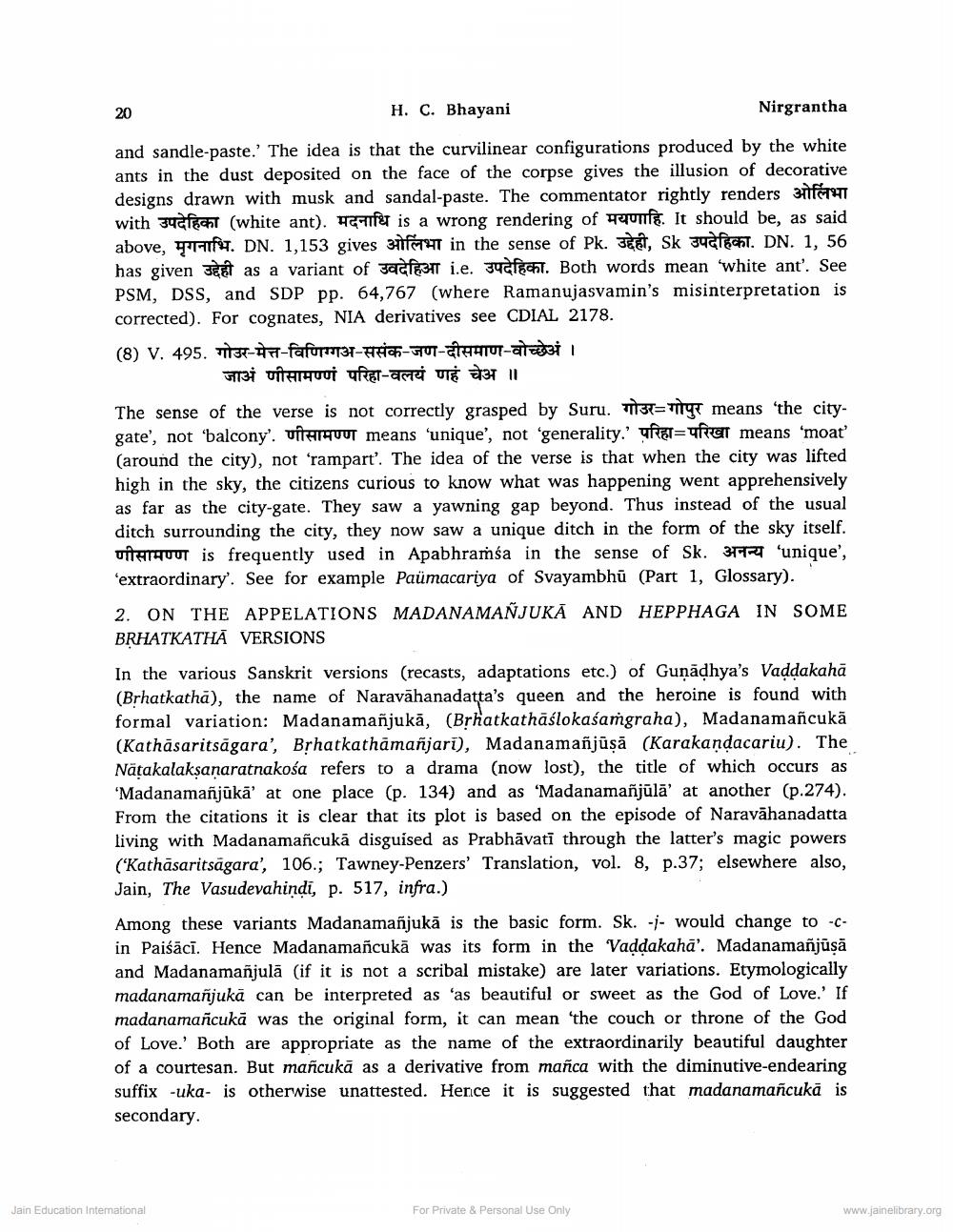________________
H. C. Bhayani
Nirgrantha
and sandle-paste.' The idea is that the curvilinear configurations produced by the white ants in the dust deposited on the face of the corpse gives the illusion of decorative designs drawn with musk and sandal-paste. The commentator rightly renders зnfé with उपदेहिका (white ant ). मदनाधि is a wrong rendering of मयणाहि. It should be as said above मृगनाभि. DN 1,153 gives ओलिंभा in the sense of Pk. उद्देही, Sk उपदेहिका. DN 1,56 has given उद्देही as a variant of उवदेहिआ ie उपदेहिका Both words mean 'white ant'. See PSM, DSS, and SDP pp. 64,767 (where Ramanujasvamin's misinterpretation is corrected). For cognates, NIA derivatives see CDIAL 2178.
20
(8) V. 495, गोअ-मेत विणिग्गअ-सक जण दीसमाण वोच्छेअं । जाअं णीसामण्णं परिहा-वलयं पाहूं चेअ ॥
-
The sense of the verse is not correctly grasped by Suru. - means 'the citygate', not balcony', ufur means 'unique', not 'generality.' ft-ufter means 'moat' (around the city), not 'rampart'. The idea of the verse is that when the city was lifted high in the sky, the citizens curious to know what was happening went apprehensively as far as the city-gate. They saw a yawning gap beyond. Thus instead of the usual ditch surrounding the city, they now saw a unique ditch in the form of the sky itself. णीसामण्ण is frequently used in Apabhramsa in the sense of Sk. अनन्य 'unique', 'extraordinary'. See for example Paûmacariya of Svayambhu (Part 1, Glossary).
2. ON THE APPELATIONS MADANAMAÑJUKA AND HEPPHAGA IN SOME BRHATKATHA VERSIONS
In the various Sanskrit versions (recasts, adaptations etc.) of Gunadhya's Vaḍdakahā (Brhatkatha), the name of Naravahanadatta's queen and the heroine is found with formal variation: Madanamañjukā, (Bṛhatkathäślokasamgraha), Madanamañcuka (Kathasaritsägara', Brhatkathämañjari), Madanamañjüşă (Karakandacariu). The Natakalakṣaṇaratnakosa refers to a drama (now lost), the title of which occurs as 'Madanamañjükä' at one place (p. 134) and as 'Madanamañjülä' at another (p.274). From the citations it is clear that its plot is based on the episode of Naravahanadatta living with Madanamañcukā disguised as Prabhavatī through the latter's magic powers ("Kathasaritsägara', 106.; Tawney-Penzers' Translation, vol. 8, p.37; elsewhere also, Jain, The Vasudevahindi, p. 517, infra.)
Among these variants Madanamañjukā is the basic form. Sk. -j- would change to -cin Paiśācī. Hence Madanamañcuka was its form in the Vaddakaha'. Madanamañjūṣā and Madanamañjula (if it is not a scribal mistake) are later variations. Etymologically madanamañjukā can be interpreted as 'as beautiful or sweet as the God of Love.' If madanamañcukā was the original form, it can mean 'the couch or throne of the God of Love." Both are appropriate as the name of the extraordinarily beautiful daughter of a courtesan. But mañcukā as a derivative from mañca with the diminutive-endearing suffix -uka is otherwise unattested. Hence it is suggested that madanamañcukā is secondary.
Jain Education International
For Private & Personal Use Only
www.jainelibrary.org




